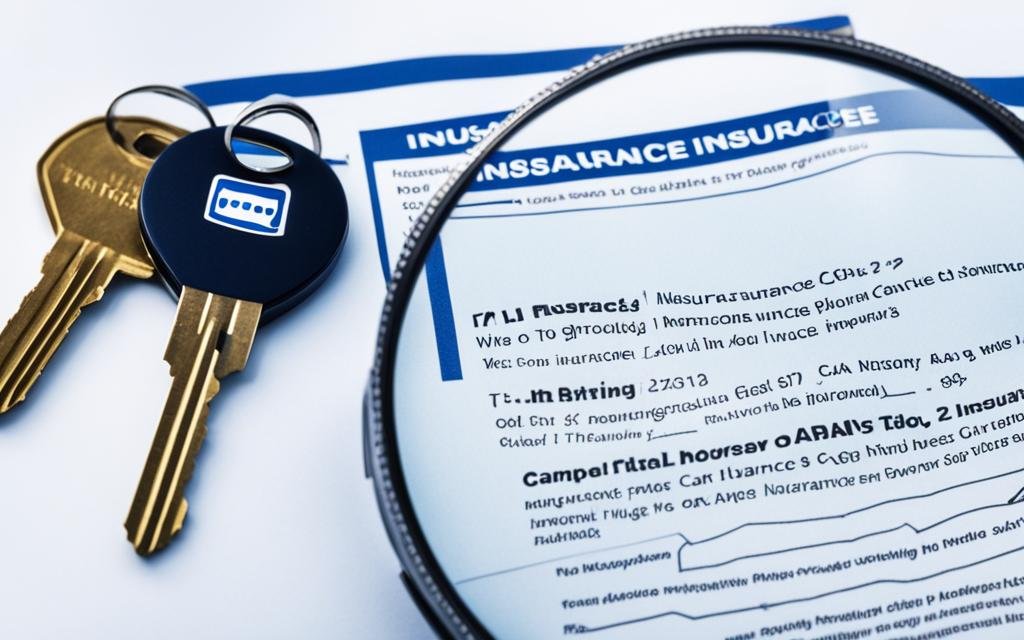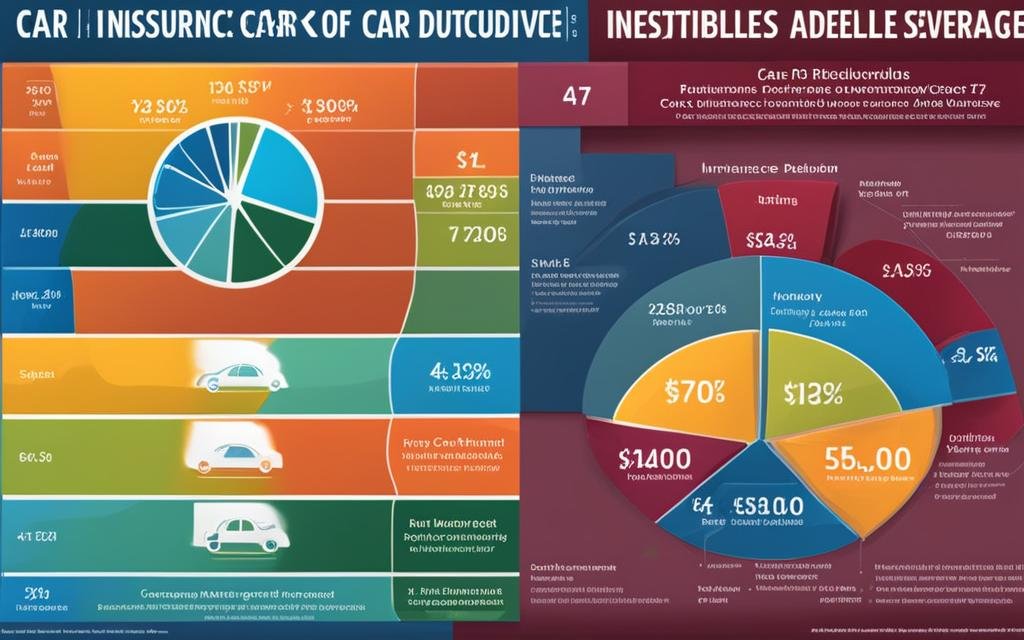Car insurance is an essential expense for car owners, but no one wants to overpay for coverage. With the rising cost of car insurance, it’s important to find ways to save money without compromising on coverage. In this article, we will provide you with tips and strategies to help you lower your car insurance rates and find the best deals and discounts available.
Key Takeaways:
- Shop around and compare rates from different insurance companies to find the best deal.
- Take advantage of car insurance discounts offered by insurance providers.
- Driving safely and maintaining a good driving record can help lower your car insurance rates.
- Consider adjusting your coverage and deductible based on your needs and the value of your vehicle.
- Regularly review your car insurance policy to ensure you’re getting the best coverage at the most competitive price.
Shop around for the best rates
When it comes to car insurance, it’s vital to find the best rates for your coverage needs. One of the most effective ways to do this is by shopping around and comparing quotes from multiple insurance companies. Each insurer has its own method for calculating rates, and factors such as your age, driving history, and location can impact the cost of your premium.
By obtaining multiple quotes, you can compare car insurance rates and find the best deal that suits your budget. This allows you to make an informed decision and potentially save on your car insurance costs without compromising on coverage.
- Compare car insurance quotes: Request quotes from different insurers to compare rates and coverage options.
- Find the best car insurance deals: Carefully review each quote to identify the policies that offer the most value for your money.
- Choose affordable car insurance: Select an insurance provider that offers competitive rates and fits within your budget.
Remember, affordable car insurance doesn’t always mean sacrificing quality coverage. By taking the time to compare quotes, you can find the right balance between cost and protection. So, start comparing car insurance rates today and secure the best deal for your needs.

Take Advantage of Discounts
When it comes to saving on car insurance, taking advantage of discounts can significantly reduce your premiums. Many car insurance companies offer various discounts that can help you save money without compromising on coverage. Here are some common car insurance discounts you should be aware of:
- Safe Driver Discounts: Insurance companies often reward safe drivers who have a clean driving record. If you have a history of responsible driving, you may qualify for a safe driver discount, which can lower your premiums.
- Good Student Discounts: If you’re a student, maintaining good grades can help you save on car insurance. Many insurers offer discounts for students who achieve high academic performance.
- Multi-Policy Discounts: Bundling your car insurance policy with other policies, such as homeowner’s insurance or renter’s insurance, can lead to significant savings. Insurance companies often offer multi-policy discounts as an incentive to keep all your policies with them.
- Anti-Theft Device Discounts: Installing anti-theft devices in your vehicle, such as an alarm system or a tracking device, can make your car less susceptible to theft. In turn, insurance companies may offer discounts for taking proactive measures to protect your vehicle.
It’s crucial to check with your car insurance provider to see which discounts you may be eligible for. By maximizing the discounts available to you, you can save money on your car insurance premiums and ensure you’re getting the best value for your coverage.

Remember, qualifying for discounts is just one of the ways to save on car insurance. In the next section, we’ll explore another effective strategy: driving safely and maintaining a good driving record.
Drive safely and maintain a good driving record
Your driving record has a significant impact on your car insurance rates. Insurance companies assess the level of risk associated with insuring you based on your driving history. By practicing safe driving habits and avoiding accidents and traffic violations, you can not only ensure your safety but also potentially qualify for lower insurance rates.
When you maintain a good driving record, insurance providers see you as a responsible and low-risk driver. This positively influences their decision to offer you lower car insurance rates. Some insurance companies even provide safe driver discounts specifically for individuals with clean driving records.
Benefits of maintaining a good driving record:
- Lower car insurance rates: A clean driving record can help you secure lower insurance premiums, potentially saving you hundreds of dollars each year.
- Greater eligibility for discounts: Insurance companies often offer discounts to drivers who have had no recent accidents or traffic violations, lowering their overall insurance costs.
- Improved insurance options: With a clean driving record, you have access to a wider range of affordable car insurance options, giving you the flexibility to choose the coverage that suits your needs without breaking the bank.
Safe driving not only benefits you financially but also contributes to overall road safety. By following traffic laws, staying attentive behind the wheel, and avoiding risky behavior, you reduce the chances of causing accidents or incurring violations.

Consider Adjusting Your Coverage and Deductible
When it comes to saving on car insurance, reviewing your coverage and deductible is a smart move. By making adjustments based on your needs and the value of your vehicle, you can potentially lower your premiums and save money.
If you own an older car that is worth less than the cost of comprehensive coverage, dropping this coverage can be a viable option. Comprehensive coverage protects your vehicle against non-collision-related damages, such as theft or vandalism. However, if the cost of this coverage is high compared to the value of your car, it may be more cost-effective to remove it from your policy.
Another way to save on car insurance is by increasing your deductible. The deductible is the amount you have to pay out of pocket before your insurance kicks in to cover a claim. By raising your deductible, you can lower your premiums. However, it’s essential to consider the potential out-of-pocket costs in the event of an accident or damage to your vehicle. Make sure you choose a deductible amount that you can comfortably afford to pay.
By carefully evaluating your coverage and deductible options, you can find the right balance between protection and cost. Remember, everyone’s insurance needs are different, so it’s important to assess your individual situation to determine the best approach for lowering your car insurance rates.

Conclusion
With the rising cost of car insurance, finding ways to save money on your premiums is essential. By following a few simple tips and strategies, you can lower your car insurance rates and find the cheapest options available.
First, it’s important to shop around for the best rates. Take the time to compare car insurance quotes from different providers, considering factors such as your age, driving history, and location. This allows you to find the best coverage at an affordable price.
In addition, be sure to take advantage of discounts offered by insurance companies. Many providers offer discounts for safe drivers, good students, and those who install anti-theft devices in their vehicles. These discounts can significantly lower your premiums.
Driving safely and maintaining a good driving record can also contribute to lower car insurance rates. By avoiding accidents and traffic violations, you can qualify for safe driver discounts and lower your insurance costs.
Lastly, consider adjusting your coverage and deductible to save on car insurance. If you have an older vehicle, dropping comprehensive coverage may be a cost-effective option. Additionally, increasing your deductible can lower premiums, but make sure to evaluate potential out-of-pocket costs.
Remember, regularly reviewing your car insurance policy and exploring different options is crucial to ensure you’re getting the best coverage at the most competitive price. With a little research and effort, you can find affordable car insurance options and save on your car insurance rates.
FAQ
How can I save money on my car insurance?
One of the most effective ways to save on car insurance is by shopping around and comparing rates from different insurance companies. You can also take advantage of discounts offered by insurance providers, maintain a good driving record, and consider adjusting your coverage and deductible.
How do I find the best car insurance deals?
To find the best car insurance deals, it’s important to shop around and obtain quotes from multiple insurance companies. Comparing rates and coverage options will help you find the most affordable and suitable policy for your needs.
What kind of discounts are available for car insurance?
Car insurance companies offer various discounts, such as safe driver discounts, good student discounts, multi-policy discounts, and discounts for installing anti-theft devices. Checking with your insurance provider will help you determine which discounts you may qualify for.
How does my driving record affect my car insurance rates?
Your driving record plays a significant role in determining your car insurance rates. By practicing safe driving habits, avoiding accidents and traffic violations, and maintaining a clean driving record, you can potentially qualify for lower insurance rates.
Should I adjust my car insurance coverage and deductible?
It’s important to review your car insurance coverage and deductible regularly. If you have an older vehicle that’s worth less than the cost of comprehensive coverage, you may consider dropping this coverage to lower your premiums. Additionally, increasing your deductible can also lower your premiums, but it’s essential to evaluate the potential out-of-pocket costs before making this decision.

